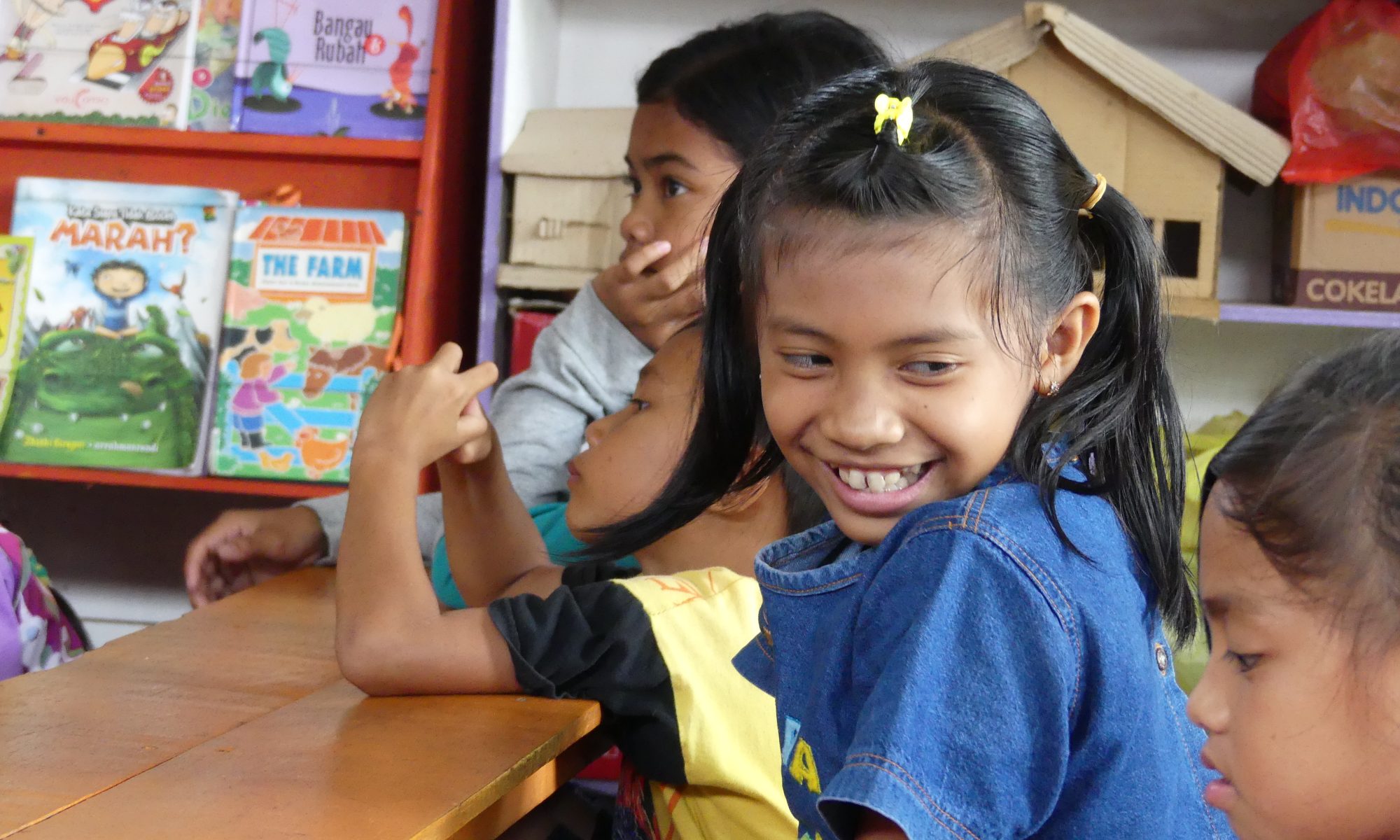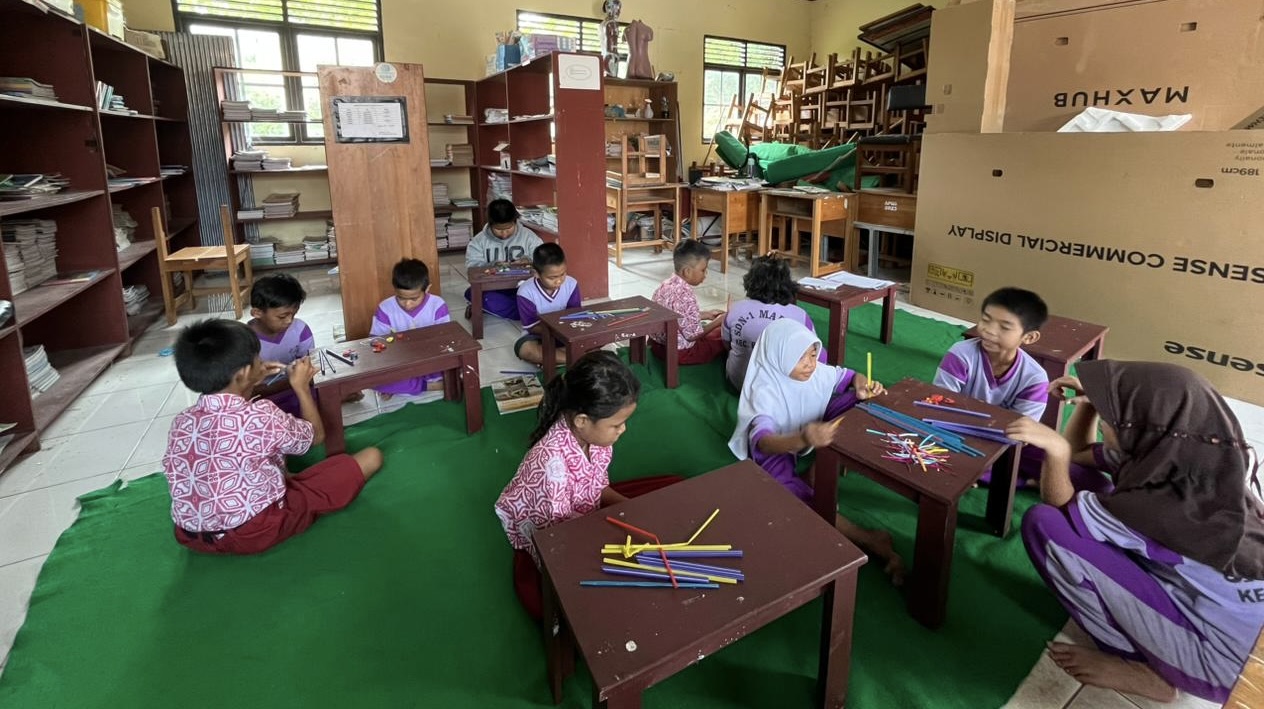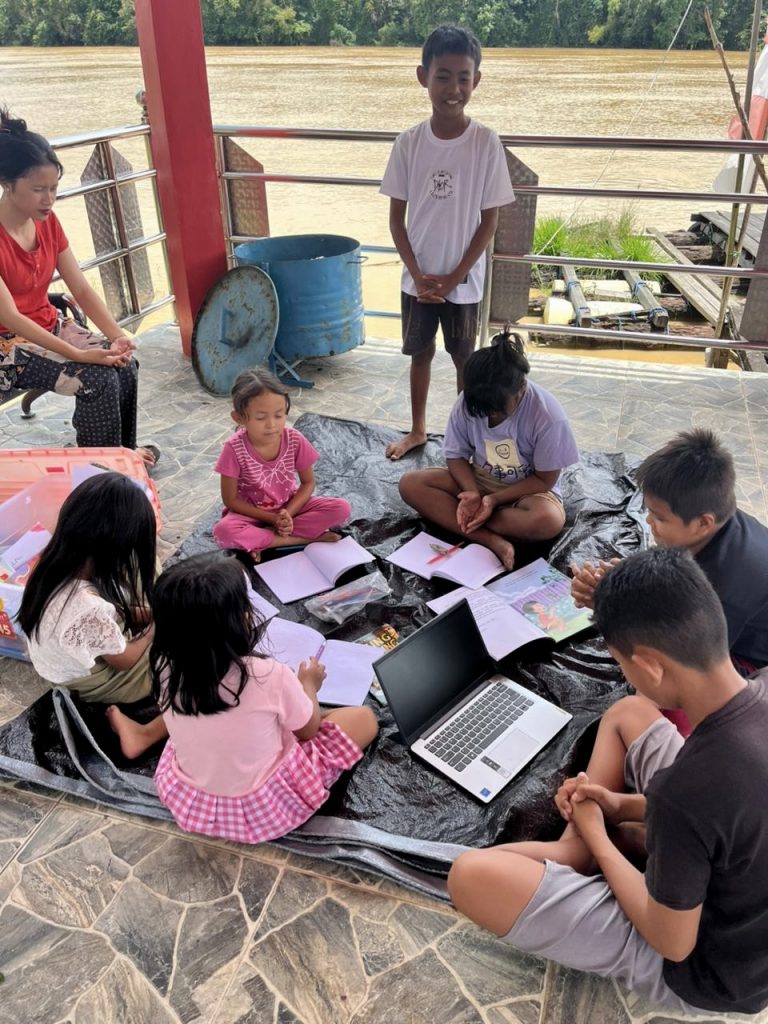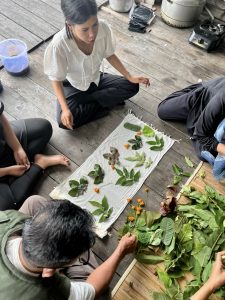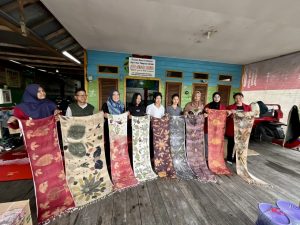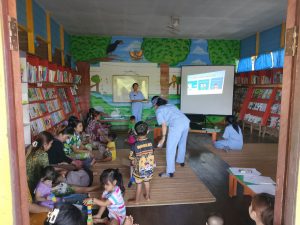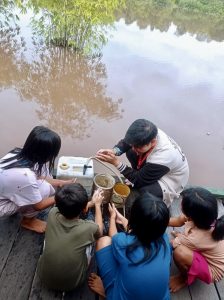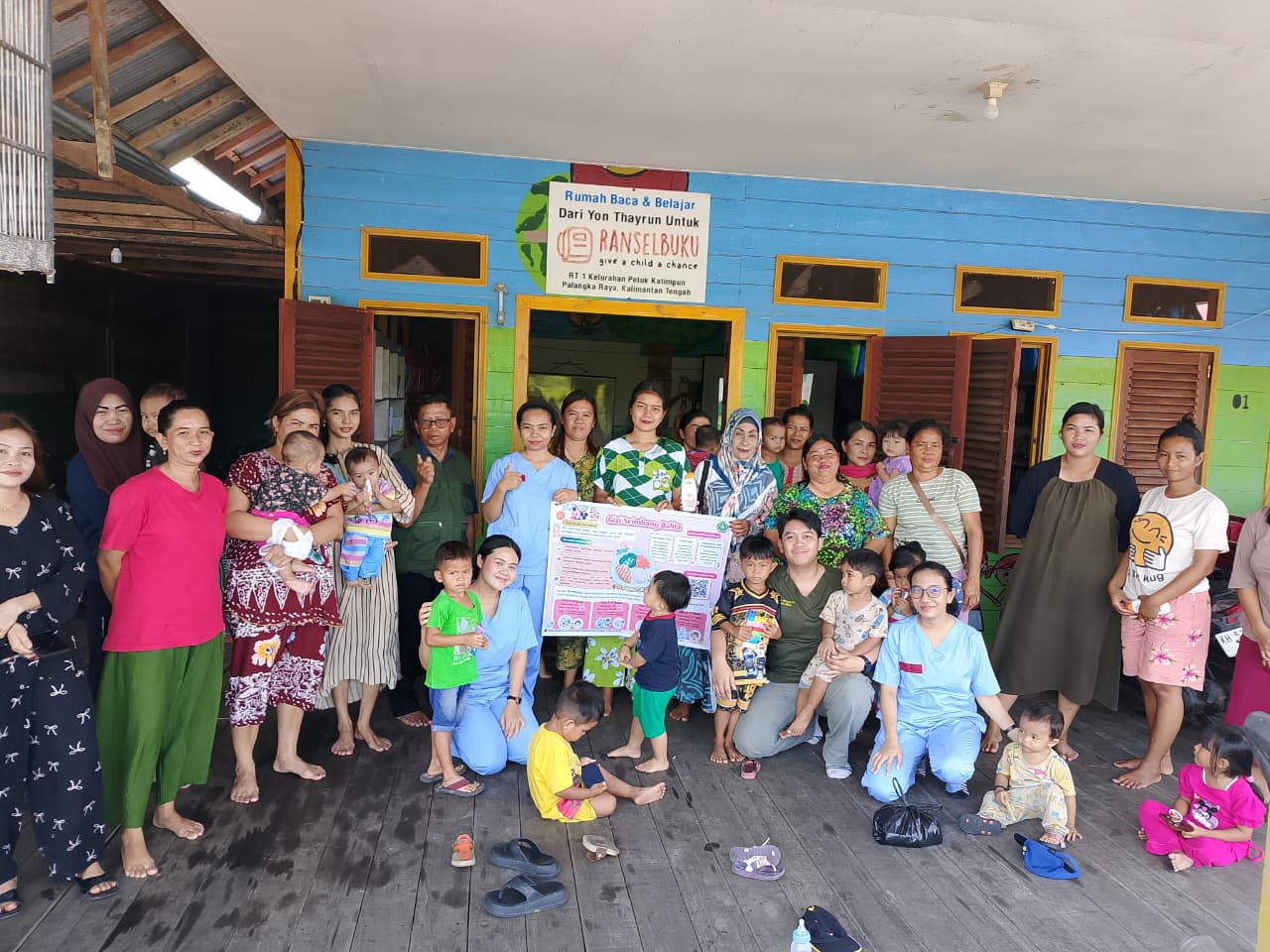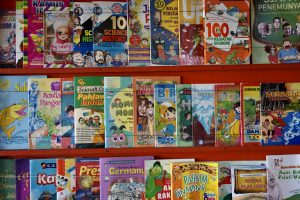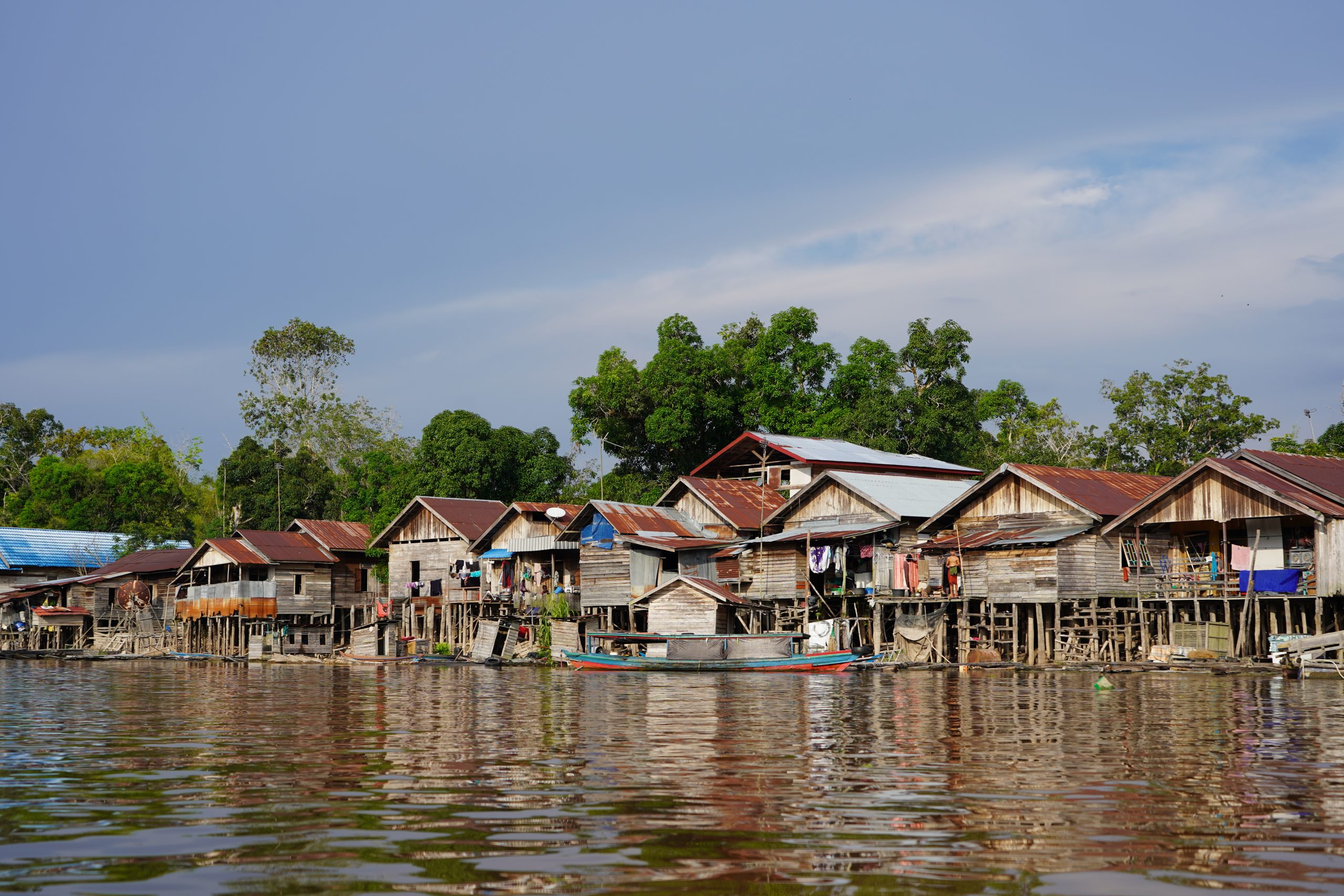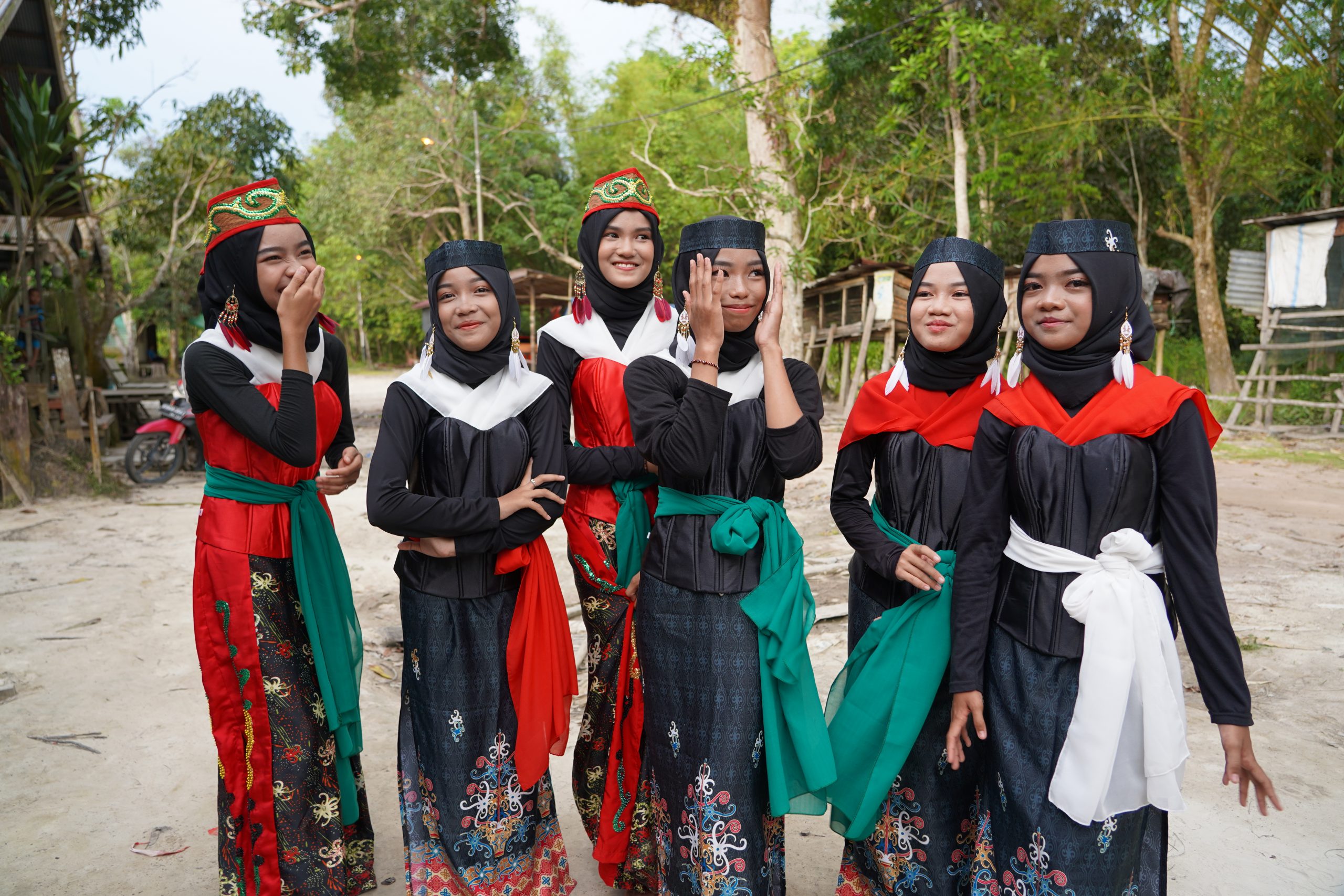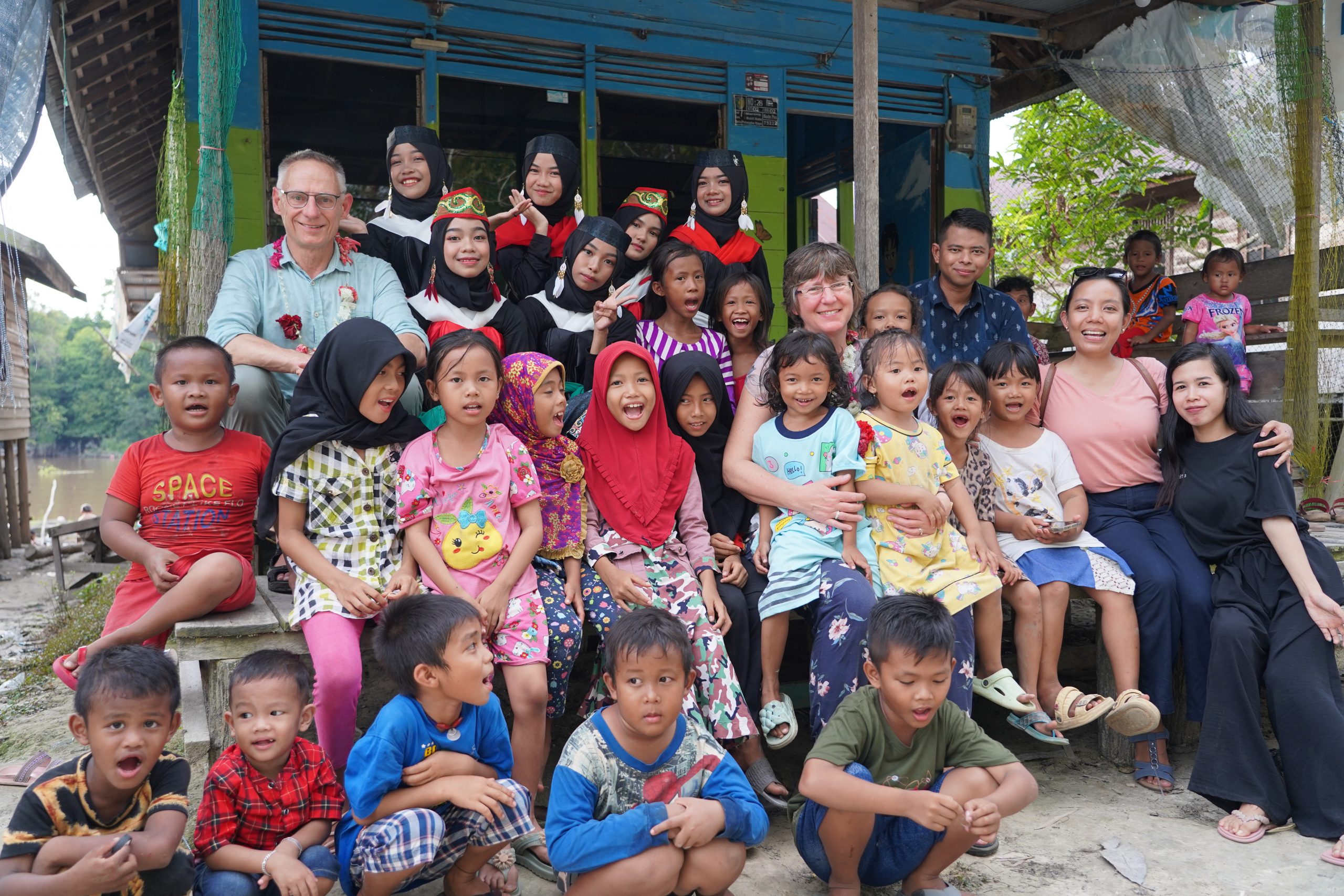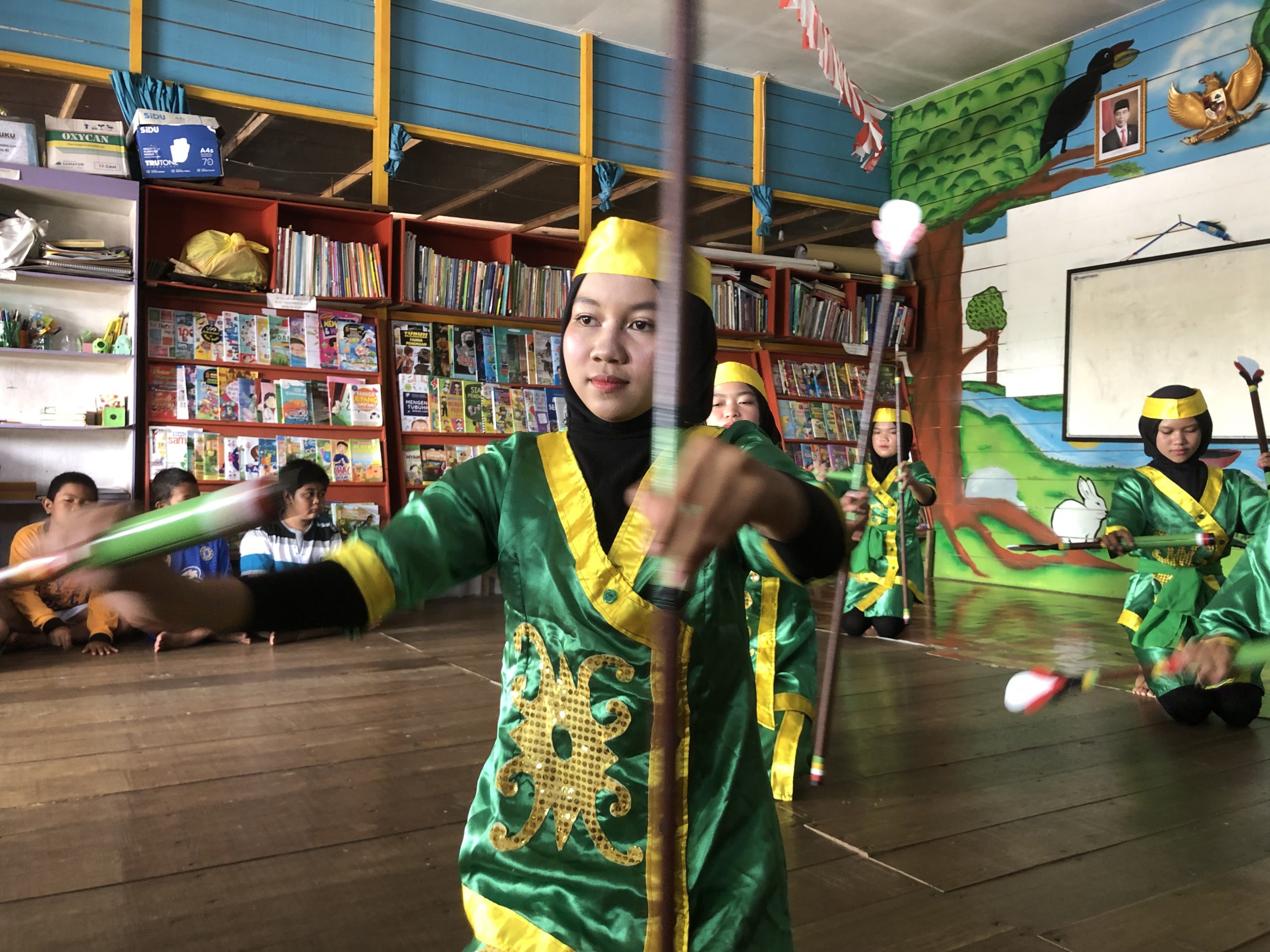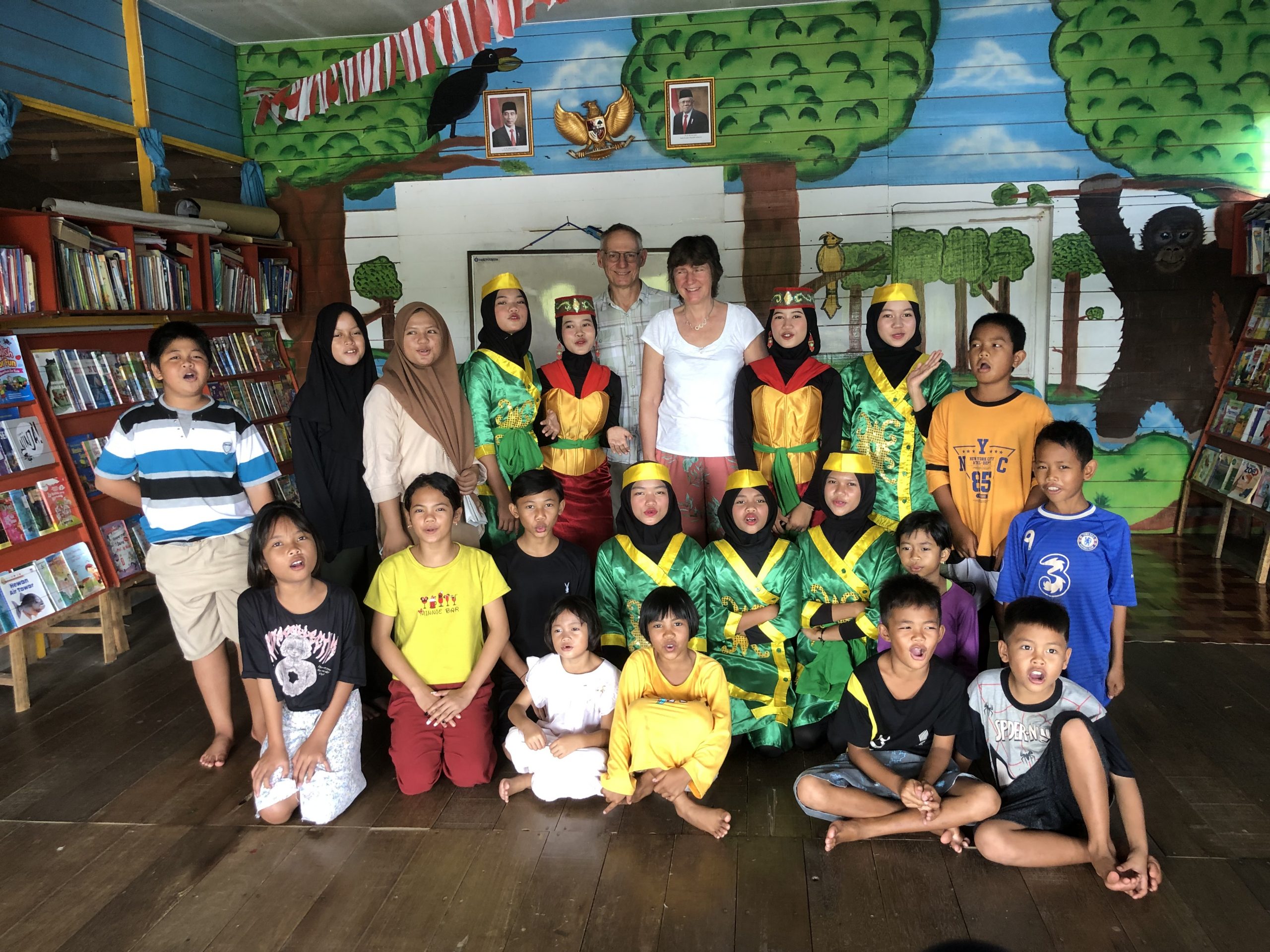Children’s Libraries, Borneo – January 2026
2025 was a challenging year for the children’s libraries in Borneo. One of our trusted teachers faced medical and family issues that affected her ability to work, and another left to teach in a remote government school. At the same time, the rapid growth of technology worldwide began to reach even this remote part of Indonesia.
Although Wi-Fi is still limited, many families now own mobile phones, which teenagers use extensively. Many parents are unaware of the risks posed by unrestricted internet and social media, and children often spend hours scrolling through their phones instead of reading or studying.
Despite these challenges, our team has worked hard to reignite enthusiasm for books and thoughtfully integrate computers into our school programme without compromising essential skills like reading, writing, and mathematics. Thanks to the dedication of our project leader, Aini, we are now seeing steady progress and positive results.
We are delighted to welcome a new, permanent teacher and to have a strong support network in place for all staff.
This year, the school introduced ecoprinting as a new skill for older children and mothers from the villages. Using natural materials sourced from the environment, participants create beautiful hand-printed fabrics. We hope this initiative will provide a sustainable source of income for the community in the long term.
The community has also been learning about health and safety, with support from the local doctor and nurses, who ran presentations and practical sessions teaching children about bodily functions and hygiene.
Our traditional dance programme continues to thrive. To encourage more boys to participate, we are going to offer sessions led by a well-renowned local male dancer, who is also the head of a dance school.
It is inspiring to see all these positive changes, and we look forward to continuing our work together over the coming year.
Embracing Change: Our January 2025 Visit to Children’s Libraries in Borneo
In January 2025, we visited children’s libraries in Borneo, funded by the MEDyARTE Foundation. It was heart warming to reunite with the children and their families. Over the last few years, we have observed a gradual yet noticeable transformation in local society, reflecting the rapid progress happening worldwide.
 One of the most striking changes has been the introduction of computers into the libraries. Although still few in number and quite basic, they have opened a window to the outside world. The children are eager to learn how to use them, enthusiastically taking turns to receive instructions. Mobile phones have also become an essential personal item, with older children spending significant time browsing Instagram and taking photographs of one another.
One of the most striking changes has been the introduction of computers into the libraries. Although still few in number and quite basic, they have opened a window to the outside world. The children are eager to learn how to use them, enthusiastically taking turns to receive instructions. Mobile phones have also become an essential personal item, with older children spending significant time browsing Instagram and taking photographs of one another.
Despite these technological advancements, there has been no significant improvement in overall living conditions. The telephone remains the only luxury item present in all households, emphasizing the value the local community places on internet access and mobile communication.
While these changes bring opportunities, they also present new challenges. Children who were once avid book readers and engaged in traditional art and music are now increasingly drawn to social media. Unfortunately, the risks and dangers of excessive internet use are not always fully understood by parents.
It is therefore more important than ever to educate both children and adults on managing internet access responsibly, understanding the negative effects of excessive social media use, and appreciating the value of a well-rounded education. The pace of change in Indonesia appears to be much faster than in Western countries, perhaps due to the sudden leap from extreme deprivation to unrestricted access to everything the internet has to offer.
Thankfully, children still play outside and spend a lot of time in friendship groups, which helps develop their social skills. They continue attending the libraries in all the villages where they are available. It is now up to us to ensure that library-based education remains engaging and relevant so that, despite the changing world, these children have a bright and promising future.
Children’s libraries 2023
In May 2023, after 3 years since the last visit, we have finally managed to travel to see how the libraries funded by MEDyARTE Charity on Borneo in Indonesia are doing. Both libraries are located in the region of Kalimantan, a short way from Palangkaraya, its main city, boasting many impressive buildings and wide avenues. It is hard to believe that only a few kilometres away the population lives in villages struggling with lack of basic necessities such as education, health care and clean water.
Marang was the first village on our route where the MEDyARTE library is located. It has 400 households and is usually accessible by car in the dry season, but during the recent floods the road got so badly damaged that we needed to take a boat. As we climbed up the steep bank we could see several children running around with excitement. It was only 9am but they had been preparing from dawn for our arrival, picking flowers for the welcome necklaces and getting dressed for a gala performance.
The children were full of enthusiasm, laughter and mischief. They have so little but that bears no relevance to their level of happiness. There is no television, cinema, computers or digital games here. As everywhere in the world the teenagers clutch their phones, the only link to the outside world and the item of pride, to take opportunistic photos but the younger children run around in groups having the time of their life; a skill and opportunity which many children in the western cultures have lost. Maybe this is what makes them so happy.
We were led to the library building recently painted in bright colours by one of the students. The library had to be moved from its original location because of the frequent flooding, posing a risk to the books and music instruments stored there. It is now located in the private house of Nikita, the music teacher whose education was sponsored by MEDyARTE Foundation. The family, who has nothing else to offer in return, is ecstatic about the use of their front room by the school. It is a haven not only for the children but also teenagers who do not have any space in their own homes for studying or being themselves. Equally, parents are extremely grateful for being able to continue with their daily chores and responsibilities without looking after the children. Kids, who previously spent time misbehaving, playing games on telephones or even using recreational drugs, are now asking for more lessons in dance and have life aspirations never heard of by villagers before.
The following day we travelled on a floating library boat, armed with a container full of books, to remote villages without any road access. The sun was beating down with an extraordinary force while the boat wound its way up the river.
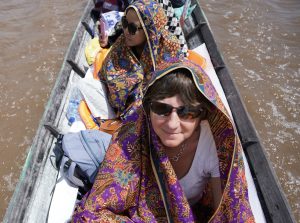 We passed many gold mining establishments, which sieve deposit from the river bed in search of traces of gold, and many fishing boats with large triangular nets. These are the two main occupations in the area. Men leave their villages before sunrise and return well after sunset to make ends meet. It is a daily struggle for survival, against the heat, dehydration and hunger.
We passed many gold mining establishments, which sieve deposit from the river bed in search of traces of gold, and many fishing boats with large triangular nets. These are the two main occupations in the area. Men leave their villages before sunrise and return well after sunset to make ends meet. It is a daily struggle for survival, against the heat, dehydration and hunger.
Thanks to our library, children, who are left to their own devices in the villages throughout the day, crave for something more, look forward to reading books and learning about the world. On our arrival they hungrily descended onto the box of books. They read avidly, devouring the knowledge. It was a pleasure to watch.
Finally, we visited the second library in the village of Katimpun. It was originally set up by our partner, the grassroot charity Ransel Buku. Together we have enhanced it by providing more books, traditional music and dance education but also supplying all the households in the village with water filters which allow access to clean water for all inhabitants.
Children proudly performed for us newly learned dances and chatted animatedly about their plans for the future. I was delighted to hear that the old practice of girls marrying around the age of 15 has been pretty much abandoned in the wake of easily accessible education.
Overall our visit has been an incredibly rewarding experience. It was clear to see that there is a gradual positive change in all communities involved in the project. They have become healthier thanks to the water filters, more open to ideas of child protection, more caring of the environment, more understanding of the importance of education and proud of their cultural heritage. It was so heartwarming and exciting to see this progress. We hope to continue supporting both libraries, educate more teachers from the villages and hopefully open another library at a different site in the future.
Life in Borneo 2021 (library project)
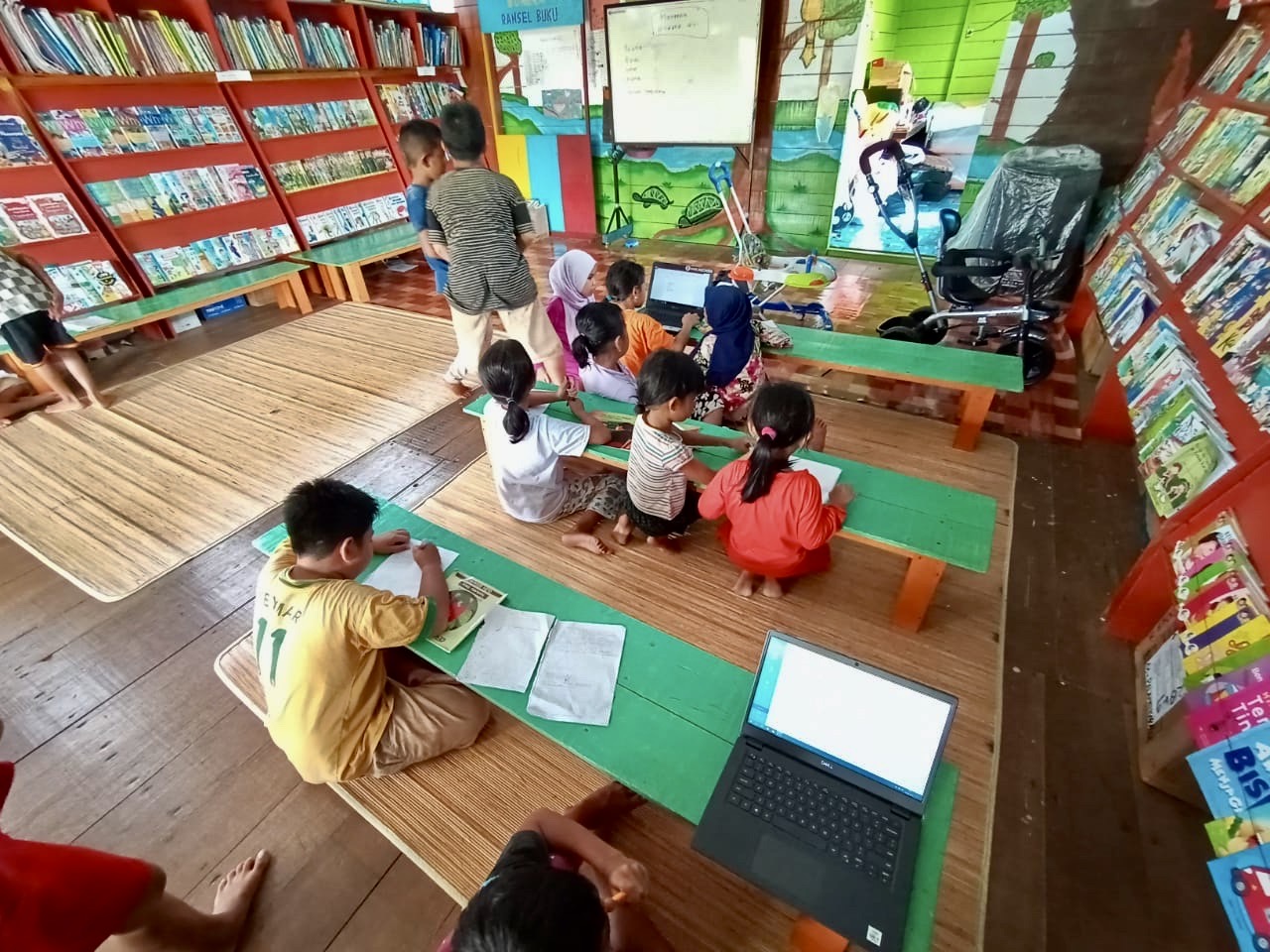
We all hope that soon life all over the world is going to start slowly returning to at least partial normality. That said, in Europe, sadly we are yet again facing the threat of a new Omicron variant of the Coronavirus. In Indonesia, the pandemic seems somewhat settled now, but over the last year the situation there has been akin to a rollercoaster of medical, economic and emotional upheavals. As recently as in July 2021, things were looking pretty grim indeed. Here are reports from the previous few months sent to us by Aini, who is in charge of running the libraries in Katimpun and Marang.
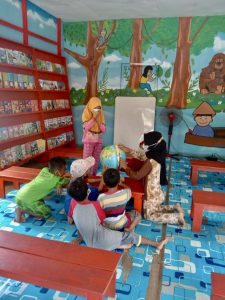 July 2021
July 2021
Indonesia’s condition is terrible at the moment. Delta variant is everywhere, nearly causing the health system to collapse, especially in Java and Bali. Vaccination process is slow and in many provinces including central Kalimantan there aren’t enough vaccines available for people to access. The other day, in Palangka Raya( Borneo) there were thousands of people queueing to get vaccines, creating a possible huge spreader event. People are so scared and disappointed.
Palangka Raya has been under lockdown since mid-July. The libraries are affected by this and are not allowed to open by the government. There are big administrative sanctions for places that open during the lockdown, even for educational purposes. Initially, all teachers pleaded to get the libraries even partially opened, despite all the restrictions, as it is very important for children to have a happy place to stay during the day. The children’s’ parents are losing jobs and often have no employment any more, which is very sad for all of them. Earlier this year there was a parent in Katimpun who murdered his wife in front of his children and then ended his life too. We have heard that this was a result of depression related to the current life situation since the pandemic hit.
I agree that opening of the libraries would actually be beneficial for the children’s mental state. However, the cases of COVID are spreading really fast and the deaths in villages we are working in are now almost daily. It is a frightening situation. So, we decided that all sorts of gatherings at the libraries are not allowed but teachers can let children get books to bring home. Some of the study materials are delivered online to be printed and given to kids, but it’s very hard to monitor everyone as the internet isn’t really there in the villages.
Luckily the situation has changed significantly since then. Aini’s report at the end of November is much more positive.
November 21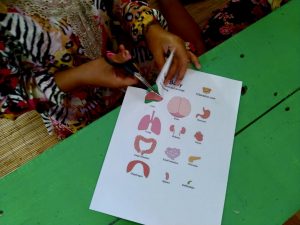
COVID-19 has finally slowed down here after the second wave which was devastating the whole country last July has subsided. Taking a break from COVID-19 news feels rather reassuring that life somehow is going to be normal again. Our libraries and the floating library have been fully operating again. Children are happy to see their teachers and are able to attend the libraries, reading, playing, and studying.
Unfortunately, Borneo is affected not just by the Coronavirus Pandemic, which is bad enough in itself, but also by global climate change which we are all hearing so much about in the recent weeks. It might seem to us, in Europe, to be a theoretical issue of the future but is a very tangible problem for Borneo’s population. Recurrent floods and weather anomalies are significantly changing living conditions on the island and are causing increasing hardship. Aini says:
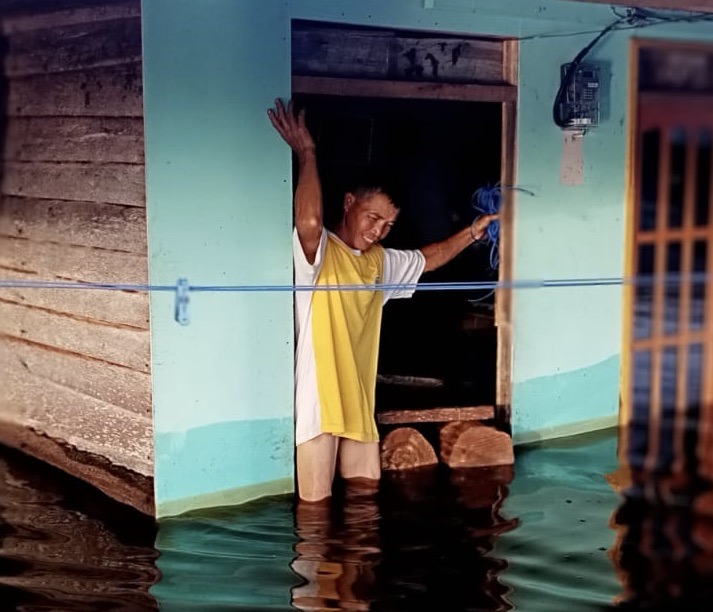
November 21
Central Kalimantan during 2021 has been getting more and more floods, especially in the villages along riverbanks.
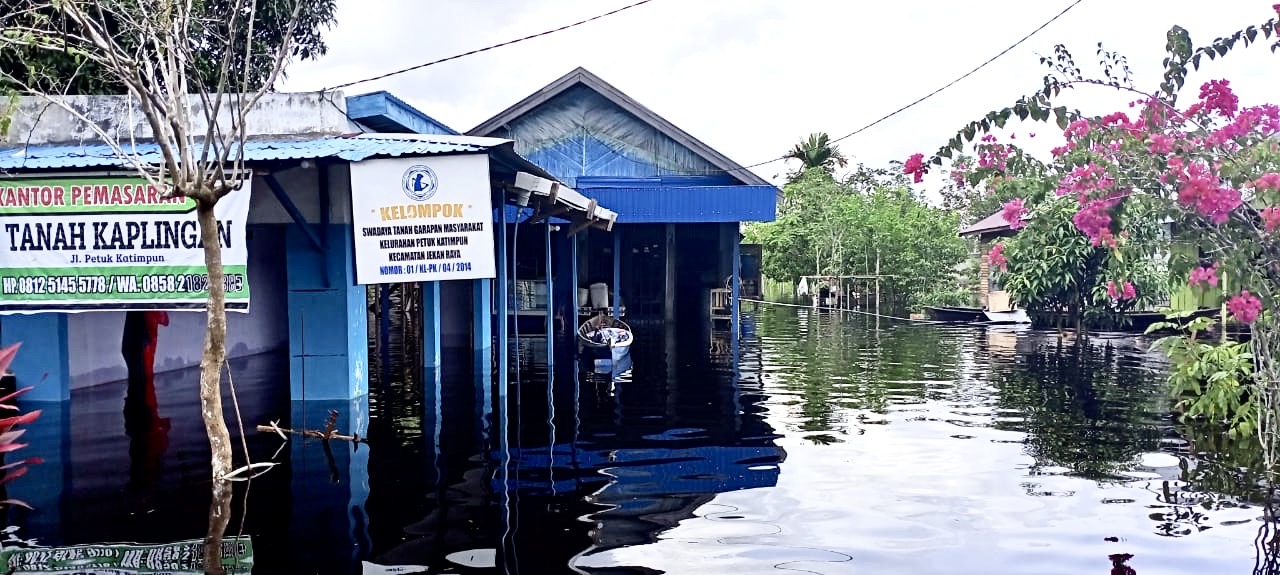
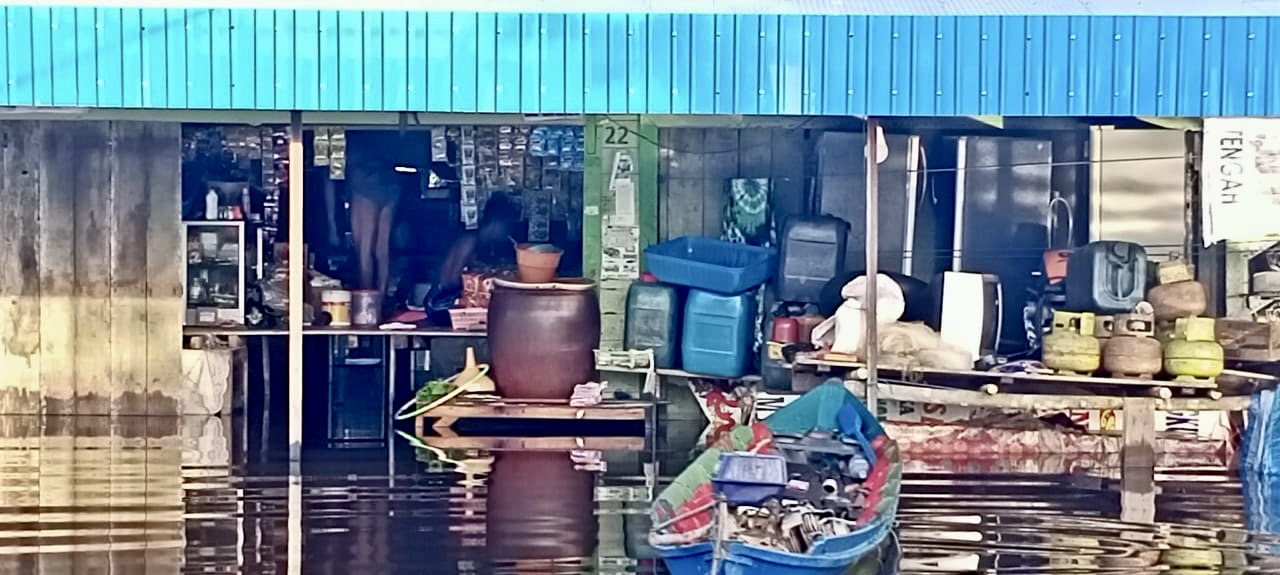
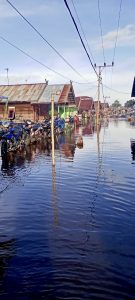
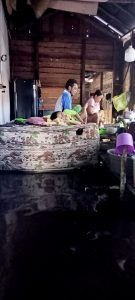
We counted 4 floods this year alone. One of them submerged the Ransel Buku Library in Petuk Katimpun knee-deep. This was shocking as when we built the library we consulted the local builders and they said it would be the most elevated building in the village which would prevent the water coming in when floods happen. It was true from 2015 to 2020. Sadly 2021 with extreme weather going around it’s no longer the truth.
As for the library in Marang, it was also flooded.
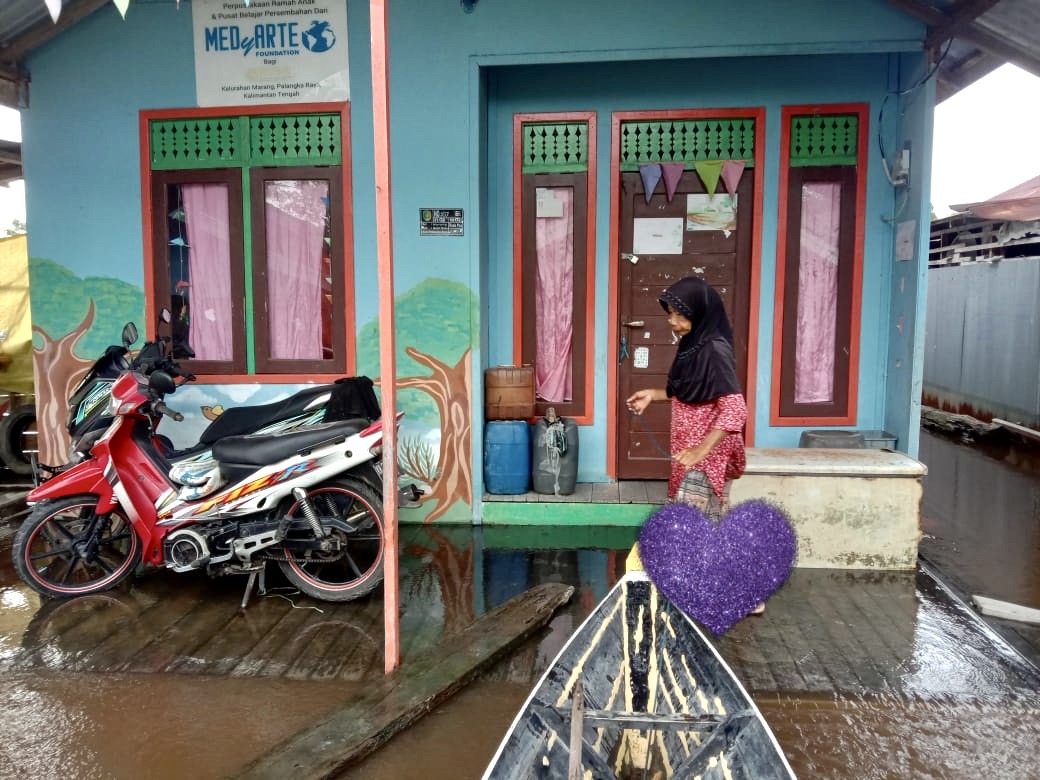
For almost a week we were working very hard to get the books and assets secured. We prepared big boats to take the books etc in case rain didn’t stop falling. Nikita (our music and dance teacher) and her parents were on standby day and night, to make sure all was safeShe has been really amazing and her family is very helpful.
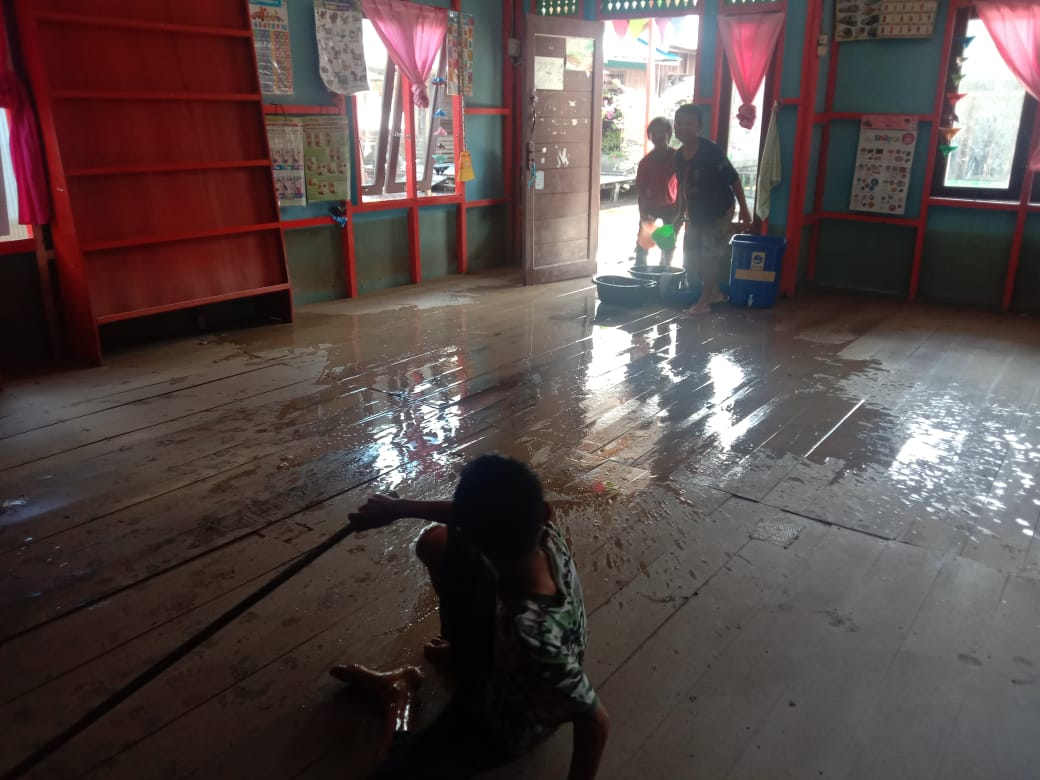
Three days ago, finally, water has subsided in all of these locations. Books are back on the shelves, kids are back in the libraries again.
Let’s hope that 2022 will bring more good news and smiles on children’s faces. We would like to create new opportunities for the adults in the villages as well. The plan is to organise traditional weaving workshops which hopefully will bring back this forgotten skill to the native Dayak population and open new income sources for the future.
Children’s Library during COVID pandemic, Borneo 2020
Since 2017, the MEDyARTE Foundation has been working together with Ransel Buku, an NGO in Indonesia in Borneo, with a view to improve access to education for primary and secondary school children. We were aiming to promote literacy, health and environmental protection education as well as to revive the traditional Dayak culture, specifically music and dance. In May 2018 our efforts came to fruition when we managed to open a second Children’s Library in Kalimantan staffed with qualified teachers who were able to support, on a daily basis, children from the surrounding villages during afterschool activities. The libraries have proved to be not only very popular but also extremely successful in improving the students ‘performance at school and laying for them a better path for the future.
Our MEDyARTE Charity, in addition to funding the library and covering the cost of employment of two teachers, has also sponsored the purchase of traditional musical instruments for the libraries and paid for the education of a music and dance teacher, Nikita, who has since been developing a programme of cultural revival in the area. Her work has been so outstanding that she has recently featured in the Bornean newspaper.
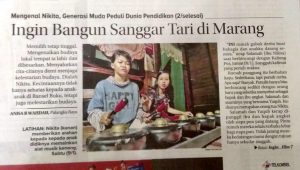
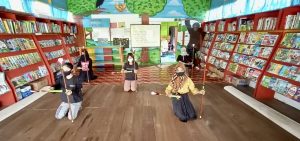
The year 2020 has been extremely challenging for everyone all over the world, including the population of Borneo, as a result of the Coronavirus pandemic. Without a doubt, you know from your own experience how exhausting it is to continue working and at the same time support your children in their online school work under the lockdown conditions. Can you imagine, however, how difficult it must be to support children in their remote education in the absence of computers, internet access or when the parents do not even know how to operate a computer?!
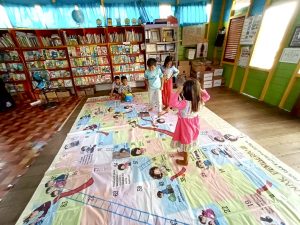
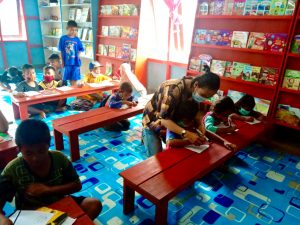
The libraries and the teachers employed by MEDyARTE Foundation have been a great blessing for many families in the Kalimantan area. Their existence is a great success story which pours optimism and hope into my heart. In the video which you can access below I speak to Aini who is in charge of Ransel Buku NGO and runs the MEDyARTE library on the ground in Indonesia. I hope you will enjoy this uplifting story.
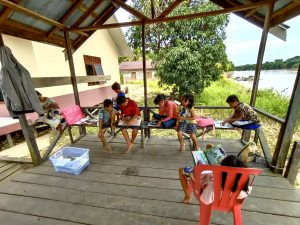
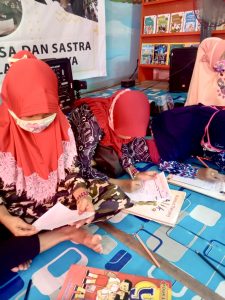
Ransel Buku project

New library founded by MEDyARTE Foundation
Yayasan Harapan Pendidikan Borneo is an NGO providing educational programmes for the villages near Palang Karaya in Central Kalimantan, Borneo and was founded by Aini Abdul in 2002.
Aini grew up in a small village in the local area and later became a teacher and a tourist guide. In the course of her work she observed the lack of adequate educational provision for village children. Coupled with her own childhood experiences she was spurred into action – her dream was to create a network of libraries in the villages along the Kalimantan rivers.
She started a Ransel Buku programme. Directly translated, Ransel Buku means “backpack of books” and initially Aini brought books to remote villages in a bag to help children learn to read and to nurture within them a love for books.
A year ago, she managed to secure funding to build a library in Katimpun village, 17 km away from the city of Palang Karaya. She successfully employed two permanent qualified teachers who divide their time between working in Katimpun library and travelling with a floating library to four other local villages. On a daily basis, a librarian visits a different village with a bag of books. Elders of the villages involved have allocated a building where children can sit and read the books throughout the day while the librarian supports them as well as organises various activities.
In the library in Katimpun, children have free access to books and receive structured teaching based on an enrichment programme comprising topics on the environment, health and culture. In addition teachers provide whatever educational support children require including writing, maths and sciences.
Before the library was operational only two out of thirty students at the local school were able to pass national exams on completion of their education but this year 100% of students were successful thanks to the support of the librarians.
The local community is fully supportive of the library programme and appreciates the amazing progress they can see in their children. Villagers actively participated, on a voluntary basis, in the building of the library facility in Katimpun, and now continue to contribute to its upkeep.
The library also provides a valuable cultural and social focal point for the local people. Dance and singing lessons are provided by local dance teachers from the Hornbill Academy of Traditional Dance in Palang Karaya, and it acts as a meeting place for adults, maintaining and promoting community spirit.
The library programme has been so successful that other villages have been enquiring about building their own. The villages in question are less remote but despite this no less underprivileged in many ways, especially with regard to education provision. Their better accessibility is an attraction as this reduces potential future transport expenses.
Yayasan Harapan Pendidikan Borneo approached MEDyARTE Foundation to help with renovation of two existing buildings in two of these villages and their conversion into libraries. Additionally, Yayasan Harapan Pendidikan Borneo would like to employ two new teachers. MEDyARTE Foundation has agreed to fund this project.
Only absolutely essential items will need to be bought in. Book shelves and tables are going to be ordered from a local woodwork shop. Mural paintings are going to be done members of the project and local volunteers.
Yayasan Harapan Pendidikan Borneo plans to involve the whole community in the refurbishment and envisages many parties in the village working together to achieve success. This community involvement is a unique feature of all Yayasan Harapan Pendidikan Borneo programmes and one they are passionate about; it aims to create a sense of belonging and unity.
Yayasan Harapan Pendidikan Borneo NGO normally provides lunch for all who help and in a limited number of cases a very small financial reimbursement. Most of the work is expected to be done voluntarily. Background assessment done by Yayasan Harapan Pendidikan Borneo indicates that the villagers are happy to work together to build a child friendly libraries in the proposed villages.
The maintenance of the buildings is expected to be done voluntarily by the villagers on an ongoing basis.
Yayasan Harapan Pendidikan Borneo estimates that two further librarians/teachers are needed to work in the new libraries and to supplement the currently overwhelmed teacher providing the floating library program. At present the floating library reaches 4 remote villages but this may expand in the future. The new librarians/teachers will be working 6 days a week (Mondays to Saturdays) at the library/learning centres.
Opening of the new library in Marang 13th May 2018

Our first library in Marang, Central Kalimantan, has now been officially opened.
This project was an exciting and on occasion frustrating journey with many challenges along the way but ultimately exceptionally rewarding and worthwhile.
We were very lucky to work in partnership with Bornean NGO and consequently benefitted from hands-on support, invaluable background knowledge and an enthusiastic local population keen to get personally involved.
A lot of work was done voluntarily by inhabitants of the village, eager for the library to be completed.
The opening ceremony was very emotional for all present.
We are incredibly proud to have achieved so much. Hopefully this will be a sustainable development which will make a lasting difference to many young people over the years.
You are warmly invited to read some first-hand accounts of the opening ceremony here.
Visit to the newly opened library – September 2018

Two trustees visited the library in Marang in order to personally assess work which has been done there. The building has been renovated to a good standard, with beautiful paintings livening the walls. Shelves were full of colourful new books suitable for all age groups. Most importantly however the children have shown remarkable enthusiasm and commitment to their studies. To welcome us they prepared several traditional dances and songs which were perfectly executed. It was a delight to watch their proud, smiley faces.
The library boasts one full time teacher as well as two part time volunteer teachers. This allows for regular sessions to be held in the library building for 80 children everyday as well as for daily visits on the floating library to the surrounding villages. We accompanied two of the teachers on their floating library visit: here we spent a few hours playing and chatting to children on mats spread under palm trees describing life in Europe, different types of food, seasons, buildings, animals…What was remarkable according to the teachers, was that the library activities and books have helped these children become more confident, develop awareness of the outside world, become curious about life in a positive way and start to have dreams and aspirations for their future.
Parents of the children from Marang village were eternally grateful for this project. All the other local villages are also keen to have children’s libraries open in their localities. We are hoping to design a way to more objectively measure the improvement in the children’s performance as a result of the positive influence of the libraries and teachers.
Watch the video “One year later”
